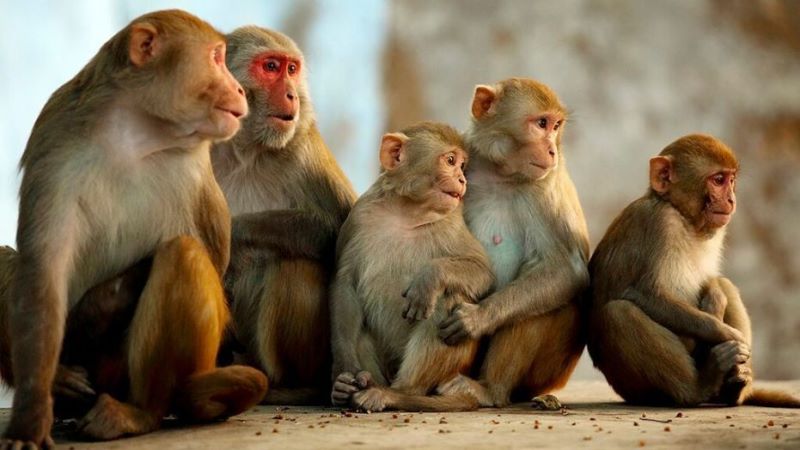How safe are monkeys from COVID-19?

By Arpana Adhikari
Kathmandu, Apr. 30: The coronavirus (COVID-19), having now travelled the globe, has already claimed over 200,000 lives and infected more than one million people.
With the first confirmed case of infection in a tiger in New York, it has raised question if humans can pass the virus to animals or not.
This has also drawn a global attention about the significant health risk posed to human beings from their pets, livestock and other animals, due to the closeness with human being. There is no evidence to prove whether the pets or other animals could be a carrier of COVID-19, but experts have been asking people to maintain distance with pets and other animals.
Though there is no confirmed case of COVID-19 in animal in the country, people living around Pashupati, Swoyambhu and other heritage sites of the Kathmandu Valley, which are known for the habitat of rhesus monkeys are worried that these boisterous macaques could transmit the virus, if they get infected.
Sabita Thapa, 38 of Gaurighat who is under a month-long quarantine shared that after reading a news that two tigers in New York were infected with the disease, she feared that the monkeys living in Pashupati area could transmit the virus to human beings if they get infected.
These monkeys have no boundaries. They travel fearlessly wherever they like and due to the closeness with humans, she feared that they could get infected with the virus anytime, said Thapa.
The growing number of simian is already a matter of worry for the people living around Sifal, Jaibageshwori, Gaurighat and other surrounding areas of Pashupatinath Temple and the fear of COVID has added further owes to them. Kamakchya Mahato, 42, a local of Gaushala, said, “These mischievous monkeys attack people, rip off food from our households, drink water from our water tank, do shit and pee on the clothes kept for drying in the rooftop.”
Like Thapa, Mahato also shared his worries that if these simians get infected with the virus, then the people living around the Pashupati area could easily get infected with the virus because they were the ones who lives in a close contact with monkeys.
“There is no escape from these monkeys. We can avoid close contact with stray animals and livestock. But we cannot avoid the contact with these monkeys, who can reach the section of our own houses, where we don’t have access,” said Mahato.
Fear of Krishna Lal Shrestha of Swoyambhu is no different from Mahato and Thapa. “Living around the Swoyambhu, famously known as monkey temple, is a constant worry for its locals. In addition, a fear of getting infected with the virus from these simians has already crippled our minds.”
What experts say?
As the SARS-CoV-2 is believed to have spread from bat to human, animals can also be a carrier of COVID-19 and transmit them back to the human beings, said Prof Dr. Mukesh Chalise, wildlife expert.
Chalise, who has done study on monkeys of the valley, shared the transfer of the virus is also easier in monkeys because the humans and simians in these areas have lived together over times.
“Animal-borne disease may be transferred easily to humans because the biological makeup of the mammals was similar to that of a human, making monkeys and other animals more susceptible of the same health problems as humans,” said Dr Chalise.
The rhesus macaque is pretty much the closest thing we have to humans, said Dr Chalise.
The analysis of the rhesus monkey genome, conducted by an international consortium of more than 170 scientists, has already revealed that humans and the macaques share about 93 per cent of their DNA.
“Hence, the simians could be carriers of coronavirus because we have common ancestor and common disease roots,” said Dr Chalise.
“It’s not known, however, whether the coronavirus will affect rhesus monkeys as it does to humans. But there is a need to reduce the risk of introducing the virus into these animals,” he said.
He said transmission of even mild animal pathogens to humans can lead to fatal outcomes. “If zoonotic disease transmitted to humans, it could cause fatal impact on human body.”
He further added that increased contact with humans could also cause hazardous effect on the health of the monkeys and other animals.
According to the Centre for Disease Control and Prevention (CDC), zoonotic disease are prevalent throughout the world. Around 60 per cent of known infectious diseases in people can be spread by animals and three out of every four diseases in people originated in animals.
Monkeys of valley can transmit other communicable disease
According to Dr Chalise, there are over 1,500 simians inside the Kathmandu Valley, more than the capacity of the habitat. “So they are being forced to encroach human settlements,” he said.
While carrying out study on monkeys in Kathmandu, he found parasites in the monkey’s faecal as well as the presence of human illness such as flu, tuberculosis, whooping cough, skin disease, diarrhea, stomach disease and sexual disease like in humans.
His finding reveals the evidence of disease transmission between monkeys and humans, because the monkeys in such places come with a close contact with human settlements.
How to avoid infection from animal?
Dr Chalise warns that showing unnecessary affection to animals during this pandemic and feeding monkeys and other stray animals does more harm than good.
He called it unhealthy, as well as unnatural. “It is strongly recommended that human-to-animal contact should be reduced to the minimum,” he said.
Recent News

Do not make expressions casting dout on election: EC
14 Apr, 2022
CM Bhatta says may New Year 2079 BS inspire positive thinking
14 Apr, 2022
Three new cases, 44 recoveries in 24 hours
14 Apr, 2022
689 climbers of 84 teams so far acquire permits for climbing various peaks this spring season
14 Apr, 2022
How the rising cost of living crisis is impacting Nepal
14 Apr, 2022
US military confirms an interstellar meteor collided with Earth
14 Apr, 2022
Valneva Covid vaccine approved for use in UK
14 Apr, 2022
Chair Prachanda highlights need of unity among Maoist, Communist forces
14 Apr, 2022
Ranbir Kapoor and Alia Bhatt: Bollywood toasts star couple on wedding
14 Apr, 2022
President Bhandari confers decorations (Photo Feature)
14 Apr, 2022










